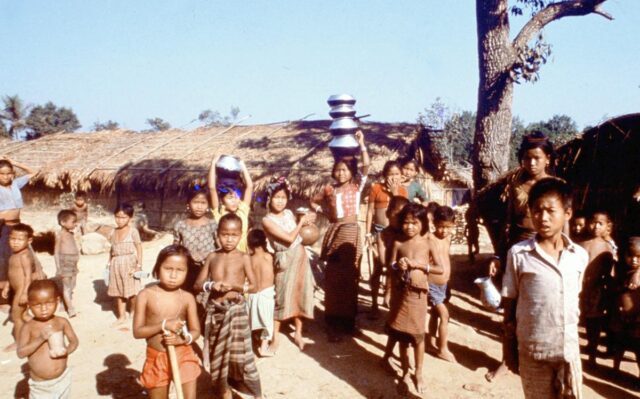Current events related to North Eastern India have always received weak attention in mainstream Indian media. They have been mostly treated as aliens to the main body of the Indian subcontinent.
This lack of awareness has been more rampant in matters related to minorities in the North East. This discussion brings us to who the Chakmas of Arunachal Pradesh are and why they are suffering.

The Chakmas are a group of people living in some districts of Arunachal Pradesh. They have been denied access to basic citizenship rights for a long time, being deprived of adequate employment opportunities.
Discrimination due to their different roots has also continued unchecked. The paucity of economic resources has driven the Chakmas to desperate conditions, including trafficking their own kin to survive.
Roots Of The Chakmas
The Chakma people comprise a Buddhist ethnic community with a rich cultural heritage. They had fled from East Pakistan along with the Hajong people and resettled in the erstwhile North East Frontier Agency (NEFA) in 1964. They originally hail from the Chittagong Hill Tracts and entered India through Mizoram and Tripura.
The Chakmas were left displaced and homeless when the erstwhile East Pakistan government commissioned the Kaptai Dam over the river Karnaphuli. They had also suffered religious persecution as it had demanded its homeland to remain a part of India after Partition.

Since the time that Arunachal Pradesh was granted statehood, Chakmas have been constantly harassed by local tribes.
Under Section 3 of the Citizenship Act, about 90% of the community was granted citizenship by birth, but the Arunachal Pradesh government is yet to recognise their rights. Also, about 4627 citizenship applications have been pending for years, despite a Supreme Court order in January 1996 to process the applications.
Read More: Why China Will Not Attack India From Arunachal Pradesh, But From This State Instead
Human Trafficking
Recent reports have revealed that the trafficking of Chakma children has become rampant. Due to the lack of citizenship rights and the backward nature of the Chakma group, such trafficking cases largely go unnoticed.
The Diyon Circle in Changlang district has an especially long list of missing Chakma children; other districts include Namsai and Papum Pare.

Many families have suffered atrocities afflicted by their own kith and kin. 13-year-old Ritu Chakma was lured by the promise of work and ended up getting sexually abused. She was later rescued by the police and restored with her family.
Another 12-year-old Bapu Chakma fell prey to work offers and was found dead later under mysterious circumstances. In Diyon Circle, almost 1 lakh Chakmas have had thousands of their children trafficked.
The high number of trafficking cases can be attributed to unemployment. Young people are drawn by work opportunities and subsequently trapped into sexual, domestic, and construction slavery.
State Apathy
The Chakmas have to face the ravages of nature with their poor socio-economic conditions. For instance, the river Dihing floods every year, causing massive erosion. Since 1971 this has caused the displacement of thousands of Chakma people. In 1994, a malaria epidemic took the lives of at least one person per household, even more so due to a lack of government aid.
Although the Supreme Court directed the grant of citizenship rights to the Chakmas in 2015, the Arunachal government has not complied.
Drisya Muni Chakma, president of the Arunachal Pradesh Chakma Students’ Union (APCSU), said, “The situation is very grim for our community in Arunachal Pradesh. We are suffering because of the present policies by the state”.

The Residential Permission Certificate (RPC) had been the only useful document for work opportunities. But even the RPCs for the Chakmas were suspended by the state government after an agitation by the All Arunachal Pradesh Students’ Union in August this year.
This development has had a detrimental impact on the Chakmas’ living conditions. Rup Singh Chakma said, “The first victim of the denial of the RPCs are job-seekers who are students. They are citizens of India and often go for recruitment in the Army. They are being denied the opportunity through the suspension of RPCs when a recruitment drive has started”.

The Chakma people are still deprived of basic necessities to live as Indian citizens. Their history as refugees from erstwhile East Pakistan still affects their existence in India. It is time for the government to take heed of and act upon the needs of minority groups like the Chakma people in Arunachal Pradesh.
Disclaimer: This article is fact-checked
Sources: The Wire, The Hindu, The Economic Times
Image sources: Google Images
Feature Image designed by Saudamini Seth
Find The Blogger: shoomedha
This post is tagged under: chakma arunachal, chakmas in arunachal pradesh, why the chakmas are suffering, lack of citizenship rights, discrimination of refugees, lack of employment opportunities, human trafficking, poverty, east pakistan refugees, chittagong hills, economic instability, human rights violation
Disclaimer: We do not hold any right, copyright over any of the images used, these have been taken from Google. In case of credits or removal, the owner may kindly mail us.
Other Recommendations:
Twitter India Tags J&K As China’s Territory; Xiaomi Shows Arunachal Pradesh As Not In India





























